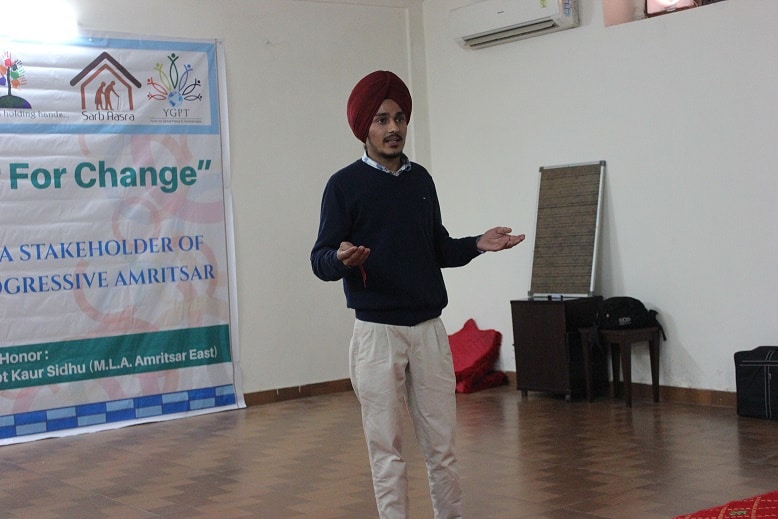“When I was a child, I wanted to make a change. My father used to tell me that if you want to do this, go for the civil services. So I always dreamt of that.” Inderpreet Singh has always been persistent in achieving his goals. On his journey to join the civil services, however, he discovered another way to make a difference.
Originally the founder of “I Responsible Amritsar,”– a student-run organisation that mobilizes youth to engage with public policy and civic issues in Amritsar – Inderpreet now works to engage the elderly in society in a productive and dignified way.
The first struggle Inderpreet faced was being allowed to study the humanities. “There is much pressure in the society, if you get good marks in your tenth standard then you are expected to go for the sciences, medicine or related streams.” However, finally having convinced his parents and his principal, Inderpreet pursued his goal and maintains, “The experience during my undergraduate studies completely changed my perspective, the exposure and my work at the ground level.” Conducting surveys and research projects was something he found very valuable.
A workshop he attended in Delhi inspired Inderpreet to start his own project. “My roommate had his own organisation in Nepal. I was inspired seeing his good work. I realised, it is not only through the civil services that you can bring change. I could bring change starting here, today. So I came back to Amritsar with the idea of I Responsible and we established that.”
However, after completing university, Inderpreet moved on to address other issues. “I Responsible is represented by the student community and will be maintained and carried forward by the students themselves. I graduated, I will exit. So another student will come and take up the chance.”
At this point, Inderpreet grappled with some confusion about what he wanted to do now. One problem that the 21-year-old was very conscious of was that of an ageing population, in a society that was increasingly failing to take care of their elders. His aunt is a very vivid example – her family is scattered across the world and occupied with their own jobs. “She is alone, and she’s retired. So you can imagine how she’s doing.”
This is a trend observable across India. He describes how “many parents are really thrown out of their homes, and even if they are living in their homes, they merely carry out the menial work. It has a negative impact on their physiology, psychology and there are social, economic and financial insecurities bothering them.”
As he was very passionate about this issue, Inderpreet decided to see what the extent of the problem was. He and his friends conducted a survey across some old age homes in the region. “I met 100 elderly people in the old age homes. I spent around half an hour with each elder person, and 80% of them cried during this process. This is the pain they have, they are just counting their days. If you ask them what their wish is, they say, ‘What wish could we have? There is nothing for us, we are just spending the days waiting for our end.’ ”
Deeply moved by his findings, Inderpreet set out to take action and founded SPEEE, the ‘Society for Productive Engagement and Entertainment for the Elderly’ The people he had talked to were often highly qualified. “I got the idea that it would be good for all if we could engage them productively in society. They are doing nothing at present, but we could connect them to opportunities or generate opportunities for them.”
But how could this come about? “Imagine old age homes where there are opportunities to engage in poultry farming, mushroom farming, organic farming, and other such pursuits which require less labour. The community of elderly people are taking care of these, and we as youth will help them to connect their products to the market. If you meet elderly people who have been working their whole life, they cannot sit idle. I found the solution is a holistic approach to solve all the problems they face at this stage of their lives. This will make them financially independent, they will be socially engaged, and they will be more active and have improved psychology and physiology.”
Inderpreet does not wish to limit his project to old age homes, and plans to engage with the larger community of the aged in the future. “For me, every individual is an asset to the society.” This is the cause which he feels to be the purpose of his life. “We have to create a world where everyone can live resourcefully and with dignity. This is the world I dream of.”
[This article is the third in our series on the Youth Venture Programme, a global initiative led by Ashoka which recognises many such inspiring teenagers across the world. The Youth Venture Programme works to empower teenagers with passion, commitment and great ideas.]
